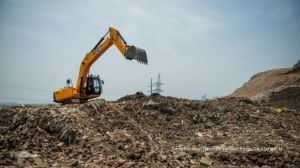Stay updated with the latest - Click here to follow us on Instagram
Now,an institute aimed at solving countrys water issues
As India has limited water resources,it should either be rationed or adequately priced.
As India has limited water resources,it should either be rationed or adequately priced. This was the point of discussion of the keynote address delivered by Minister of Water Resources Pawan Kumar Bansal at the launch of the CII-Triveni Water Institute,organised by the Confederation of Indian Industry (CII) to mark Corporate Indias entry into the field of water conservation on Wednesday.
The CII-Triveni Institute which would have centres in Delhi,Jaipur,Bangalore and Pune promises to be the first establishment of its kind in the world. It would bring together the government,industry and civil society in changing water conservation and management practices of the industry. In the Capital,the institute would work closely with the Delhi Jal Board to ensure that commercial establishments are able to achieve at least 30 per cent reduction in water usage. This will be ensured through efforts aimed at prevention of water wastage as well as conservation.
Dhruv M Sawhney,Chairman and Managing Director of Triveni Engineers and Industries Limited,said: The need of the hour is to galvanise a national movement for waste water management and water conservation. There are four focus areas municipal,domestic,industrial and agricultural. We plan to devise certification courses that will not only
create awareness in various sectors but also ensure direct
and indirect employment for 10,000 people.
The CII has also come up with blue rating for companies,based on performance with regard to water conservation and management measures. We intend to introduce,with support from the government,a performance rating system for firms based on water-management practices, Sawhney said.
Bansal called upon the institute to focus on agriculture,which accounts for 85 per cent of the total water use in the country. He said the institute should make farmers ensure that they adopt practices that will lessen use of water without compromising the yield.
The problem of diminishing per capita availability of water cant be viewed as a demand-supply problem.
Holistic planning and water management is the need of the hour,and I believe the water institute can set a new benchmark,so that the industry can play a salutary role in policy formation, Bansal said.








